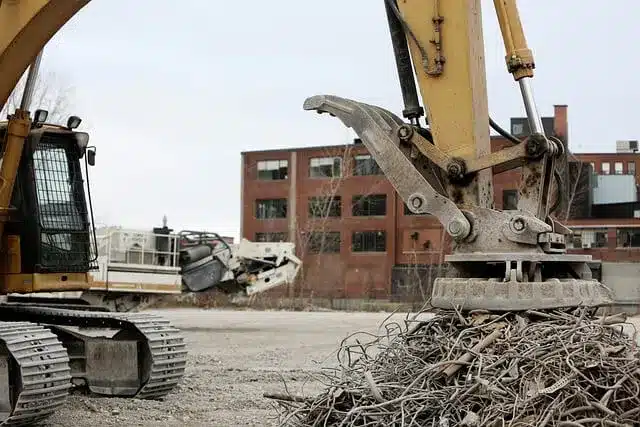Whether building a commercial building, renovating a home, or paving a road, waste is inevitable in any construction.
According to statistics, the construction industry is among the most wasteful sectors in the world. It’s estimated that demolition and construction activities have generated up to 40% of the total solid waste generated yearly. Experts expect this to grow in the coming years.
The world population is said to increase by about two billion people by 2025, increasing the demand for more housing and infrastructure, which also likely lead to more waste generated by the construction and demolition industry.
Unfortunately, most construction waste is in landfills, contributing to pollution and higher carbon emissions. Due to the significant negative impact, it can have on the environment, you want to have a safe and efficient construction waste disposal strategy.
In this article, we’re sharing the proper ways to dispose of construction waste and some practical tips for your overall waste strategy on your construction site.
4 Proper Waste Disposal Methods for Construction Waste
During and after construction, you can manage your waste in several ways. This section shares easy and sustainable ways to manage your construction waste.
Get A Dumpster
A dumpster or skip bin is a huge garbage container with an open top. It comes in varying sizes, most big enough to load significant construction waste. However, you may need to hire multiple dumpsters for larger constructions to accommodate your waste production.
Generally, dumpsters can be hired from private companies or provided by your local government. The dumpster rental process starts by identifying the amount of waste you’re expected to generate. Then you must choose the right size and schedule delivery and pickup. The waste collected will be disposed of properly by the skip bin company.
Donate
Some construction materials or waste that are useless to you may help others. For instance, extra, unused materials such as wood, bricks, nails, or wiring can find a new home by donating them to those in need.
Repurpose
One of the best things you can do to your construction waste is to recycle them. For instance, scrap metals or broken tools can form a single detector which can be used for outdoor ornaments or other valuable tools.
Recycling Centers
If you don’t have the time to recycle items, you can also sell them to a scrapyard or a recycling center. These facilities can perform recycling procedures such as turning used wood into engineered wood or transforming scrap metals into new metal forms.
4 Tips to Properly Dispose of Construction Waste
Now that you know how to dispose of construction waste sustainably, this section shares valuable tips and strategies to manage waste properly.
Develop A Plan
Generally, you want to create a waste disposal plan before your materials arrive on site or the construction begins. Your construction waste disposal plan should assess several factors, including the following:
- How to manage and store waste on-site?
- Who will be responsible for waste management?
- Which materials are most likely to be used and become waste?
- How much waste is expected per phase of the project?
- How is waste removed?
Ideally, you want to consider efficiency while planning your waste disposal strategies. You also need to consider the safety of workers and how it will impact the environment. Ensure your plan complies with federal and local guidelines and industry regulations.
Create A Classification System
Forming a construction waste classification system can help ensure safety and efficiency in waste processing after disposal.
Generally, a classification system should include the following:
- Waste code
- Name of waste
- The construction process that produces the type of waste
- Whether or not the waste produced is hazardous
- Any particular issues, requirements, or information related to the waste.
A sound classification system can help you decide how each waste is handled while providing the necessary paperwork to your waste contractors.
Consider Waste Reduction Strategies
Reducing the waste generated is one of the best ways to make the process more efficient. And there are several waste reduction strategies you can implement.
For instance, you should invest time in material management to prevent waste from extra or damaged materials. You may also consider off-site construction or minimize material handling and the waste generated on-site. Or you can also use selective deconstruction and demolition methods to minimize the waste produced during reconstruction.
To further support these efforts, regularly cleaning the site is essential to reduce waste accumulation. Hiring professionals for Construction Cleaning ensures that leftover debris and materials are promptly removed, keeping the site organized and safe. This not only improves efficiency but also contributes to a safer, more manageable work environment for both workers and clients.
Do Regular Waste Audit
Waste audits are essential, particularly for long-term construction projects. It should be performed regularly, ensuring that your construction teams follow the identified protocols and strategies.
Regular waste reviews can help you adjust your construction waste plan as necessary based on the changes to the project. Also, they help identify new areas of opportunities or concerns for disposal that weren’t evident during the initial stages.
Takeaway
There’s no denying that construction projects, regardless of the size, can create significant amounts of waste. However, by knowing the proper waste disposal methods and strategies, you can have a more efficient waste management process that Mother Earth approves.
